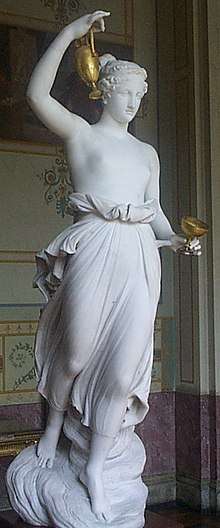Hebe
English

A statue of Hebe

Hebe astronomical symbol
Etymology 1
From Ancient Greek Ἥβη (Hḗbē, literally “Youth, Prime of Life”).
Pronunciation
- IPA(key): /ˈhiːbi/
- Rhymes: -iːbi
Proper noun
Hebe
Translations
Translations
a family of alpine plants found mainly in New Zealand
|
Derived terms
Etymology 2
Short for Hebrew.
Pronunciation
- IPA(key): /ˈhiːb/
- Rhymes: -iːb
Noun
Hebe (plural Hebes)
- (slang, derogatory, offensive) A Jew.
- 2005, "Creed, OK", Carnivàle episode 17
- Well, that's what you get for betting on a Hebe.
What did you say?
I'm just saying
Max Baer ain't no Jew.
- Well, that's what you get for betting on a Hebe.
- 2005, "Creed, OK", Carnivàle episode 17
Synonyms
References
- Ovid does not detect a unity of Hera (Juno) and Hebe (Juventas): he opens Fasti via with a dispute between Juno and Juventas claiming patronage of the month of June (on-line text).
Polish
Etymology
Borrowed from Ancient Greek Ἥβη (Hḗbē), from ἥβη (hḗbē).
Pronunciation
- IPA(key): /ˈxɛ.bɛ/
Portuguese
Etymology
From Latin Hēbē, from Ancient Greek [Term?], from Ancient Greek Ἥβη (Hḗbē).
Pronunciation
- (Brazil) IPA(key): /ˈɛ.bi/
This article is issued from
Wiktionary.
The text is licensed under Creative
Commons - Attribution - Sharealike.
Additional terms may apply for the media files.